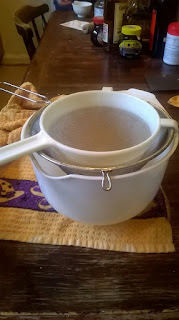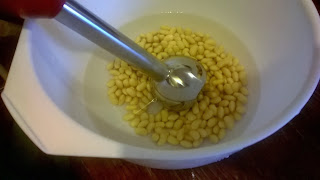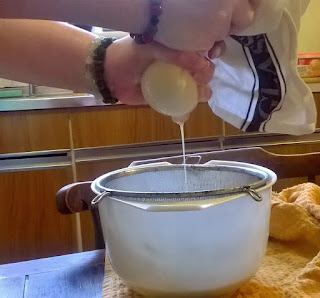Soy Milk
Adventures in Alchemy!
I was lactose intolerant as a child. So we ended up getting goats and switching to goat milk. I "grew out of it" until I got a head injury at uni and all my childhood allergies went nuts, so to speak.
I had been vegi on and off most of my childhood and as I was so sick (like really) and way before it became a thing I went vegan. I switched to soy milk about 1999.
While I wasn't vegan for long (both pregnancies I craved meat, steak and chicken respectively) I never went back to regular milk. After my daughter was lactose intolerant too it seem a sensible idea. In that time soya milk has become better tasting and better quality. It has become easier to get too.
It was a thing I had to have. It was not a luxury, nor a pleasure.
Well I am food mad. I love to eat, cook, read and now watch youtube. My current "find" is Mike Chen (who has a squillion channels and it is just enough) especially Strictly Dumpling.
On one of his many food adventures he gets soy milk in a way I had never seen it and it looked GOOD!
I did some research and tried to find my own version. The first time worked well, too well! I was so focused on making (and then eating) I took no videos or photos at all!
I set up two sieves so I could keep my straining cloth (a super clean tea-towel) and measure out a single cup measure at a time of beans (so I didn't over fill the bowl and get my ratio wrong).
I threw away the soaking water and measured out (those are my darling daughter's hands) one cup of soaked beans.
We then added two cups of fresh water.
Now my stand mixer broke yesterday (just I was set up to blend in case you were wondering)!
The stick mixer to the rescue. I don't have very heavy bowls so I blended while darling daughter held the bowl!
It got a bit messy but we made it. It got all foamy and cool looking.
The next bit required some prep.
This is another bowl a heavy sieve and the clean cloth. You can use cheesecloth, muslin but fabric is sort of essential for the next bit.
Carefully pour the mix into the cloth/sieve and let it drain a moment. Then gather the corners carefully and begin to twist. If you don't start high enough it will squish up instead of down and makes even more mess. Ring it out twisting the top and bottom in opposite directions. I then twisted the other way, just to be thorough. Next carefully unwrap the cloth and pick out the weird snowball of stuff. Apparently you can eat this too, but I have no recipes as of yet!
Instead I threw it onto the garden for the plants and birds (it composts well). I then repeated the whole thing with the remaining beans. Then I got my nice big pan added a tsp of salt and a 1/4 cup of brown sugar. I poured the soy milk into the big pan.
You have to stir constantly (I used a non-stick whisk) and simmer until "sweet". Mine was fine about a minute or so after I took it from the hob when it reached a boil.
It foams out a lot but I just kept mixing the hell out of it!
After a minute of stirring in the still hot pan my taste tester (aka darling daughter) said it was ready.
I added a pinch of pulverised vanilla powder and serve it hot and foamy!
You will need:
1 cup of dried soy beans
cold water to rinse and soak.
2 cups of water for every 1 cup of swollen beans (mine doubled and a bit.)
1 tsp of sea salt
1/4 cup sugar (sugar substitute to taste)
I hope this is helpful to you. It was a lot of fun to make and is so tasty. We even have beans soaking for tomorrow!
Home education is too important to takes seriously.



































